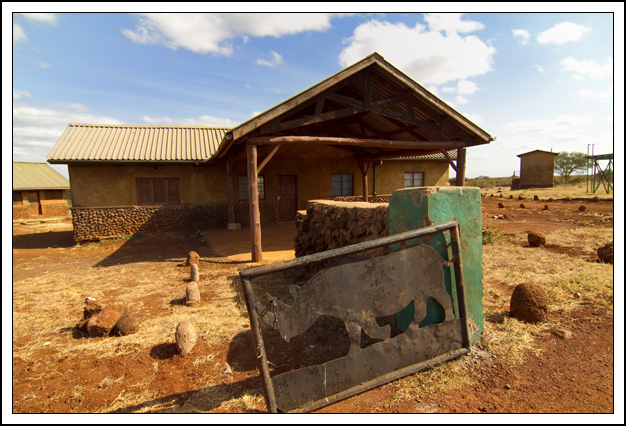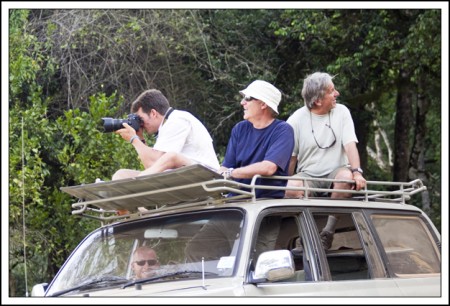As she and her husband neared Lake Paradise, Osa Johnson said she felt “nervous little shivers of excitement running up my spine and into my hair.”
I looked about me, slowly, breathlessly. I saw a spot of unsurpassable beauty—a cool, turquoise lake surrounded by clean, virginal forest where fantastically beautiful birds colored the trees. I listened, and knew that if I could hear all the ageless echoes which had resounded against these cliffs, it would be no familiar human sound, no heartening melody of companionship.
This, I realized, was the end of our journey.
The side road to Marsabit National Reserve, where Lake Paradise is located, is unremarkable; a rust-colored trail lined with red volcanic rocks leading to the deserted park outpost, a stone building with a dusty green corrugated-tin roof; we open and pass through the creaky metal gates decorated with silhouetted cutouts of rhinos.
Our Land Cruiser climbs the grade up the extinct volcanic crater slowly as the landscape changes from low grass to thick brush to a forest montane of old cedars and gnarled African olive trees, their branches laced with delicate filigrees of Spanish moss, just as Osa had described.
Mosque swallows and swifts dive above clouds of small white or yellow butterflies; a mating pair of goshawks flirt in the crater thermals above us. As we drive through the cool air of the cloud forest, Calvin says, “I have to admit I’m excited to be here and see what we’re going to find.”
Then as we come over a rise, the forest opens up and there before us is a natural amphitheater ringed by the sheer walls of a 200-foot high caldera. Calvin stops the vehicle and we all climb out. Clouds of butterflies float over blue-flowered verbena. A flock of black-and-white Egyptian geese, noting our presence, squawk in protest; a dozen sacred ibis rise from the oozy shoreline into the cerulean sky. And there, in the middle of a green, boggy meadow dotted with black mud holes and small pools of water, is a herd of elephants—15, maybe 20—who stop their drinking and lift their trunks high into the air, waving them to and fro as if to welcome us to their home.
Nervous little shivers of excitement run up my spine; after many days and hundreds of miles of difficult road, we have reached Lake Paradise.
Tags: Lake Paradise
-
Needless to say, no longer the lake it once was osa first saw it. no more “cool, turquoise lake…” Will be interesting to understand what ushered in the change. As well as learn how difficult it is now for a person to traverse the lake bed itself.
-
Hey Dave, Did the elephants exit the lake bed while you were there? Wondering how close you were able to get them, or if you wanted to get close! ENJOYING THE BLOG!
Comments are now closed.



3 comments